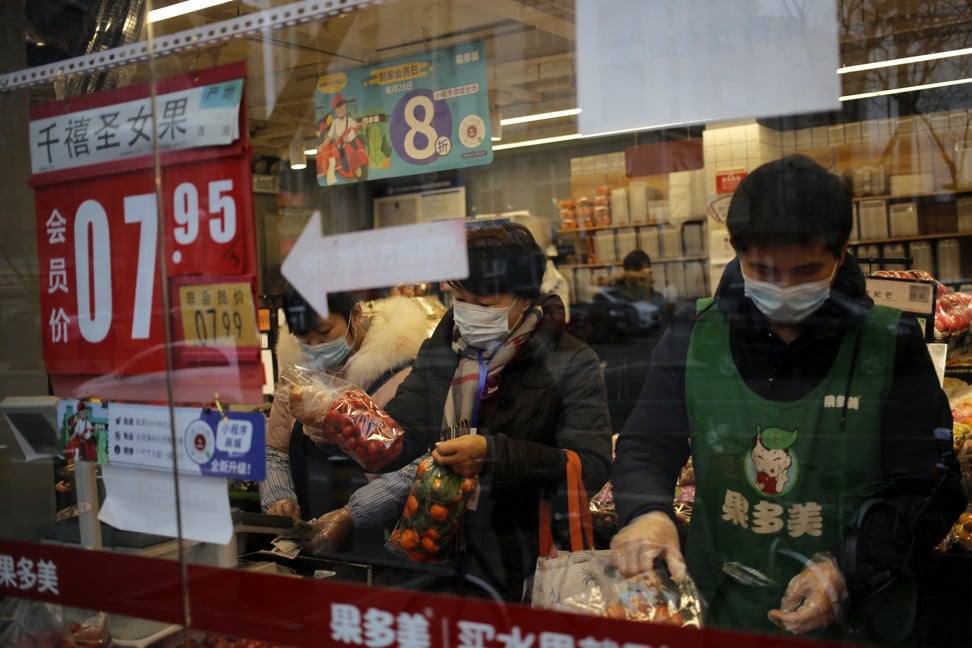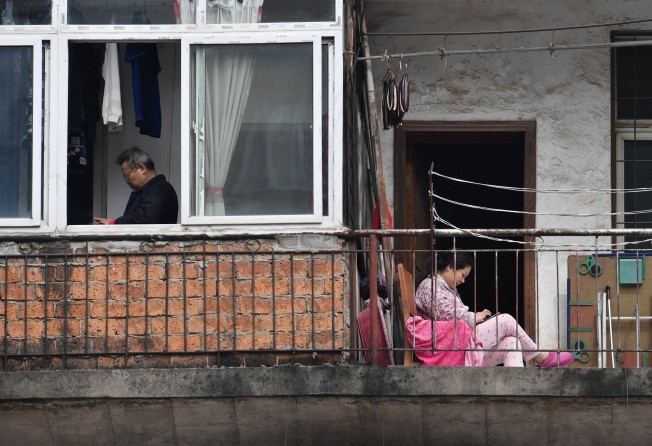
China’s mental health counsellors reach out online to help those affected by coronavirus pandemic
- Chinese users spent 20 per cent more time on physical and mental health apps in the first week of March compared with the same period in January
- KnowYourself brought together a team of over 100 professionals and trained volunteers to reply to calls for help from people in need

Three days after Chinese authorities ordered the Wuhan lockdown in late January, Shanghai-based psychological adviser KnowYourself made its online consultation service free for Covid-19 patients, medical workers and people suffering mental problems amid the unfolding health crisis.
The company brought together a team of over 100 professionals and trained volunteers to scan messages sent in by people in need, offering them text-based psychological counselling as well as the option of support via video and voice calls.
The demand for mental health care “has kept the team fairly busy … they sometimes discuss certain tough cases late into the night,” said Zhao Jialu, a KnowYourself partner in charge of the company’s psychology team.
Another consequence of the rapidly-spreading coronavirus, which as of Friday had sickened well over half a million people and killed more than 24,000 worldwide, is that patients, medical staff and even those not infected by the disease have experienced mental health problems, including anxiety, depression and stress.
Zhao witnessed first hand how public sentiment changed as the pandemic evolved.
“When it first broke out, fear and anxiety were awakened in people due to the sense of uncertainty about the virus,” she said, adding that feelings of shame were also common among medical workers when they could not save patients or were not sent to the front lines like some of their colleagues.
By early February these feelings turned to despair, loss and even anger, Zhao said. That was when China recorded its highest daily number of new Covid-19 patients, more than 3,000 each day between February 3 and 7.
Widespread anger was triggered by the death of Li Wenliang, one of the first doctors to try and share information about the coronavirus in its early stages – only to be reprimanded by police. Last week, the local public security bureau apologised to Li’s family and said it would withdraw the reprimand.

As the pandemic eased in China, psychological inquiries from medical staff have declined but the general population remains worried about the impact on the economy and the rise in unemployment, Zhao said.
Data from online medical consultation platform DXY showed that for the past two months, 90 per cent of mental health-related inquiries have come from ordinary citizens, with the remaining 10 per cent from doctors and nurses.
However, the trauma felt by those directly affected can be long lasting. A year after the 2003 severe acute respiratory syndrome (Sars) epidemic, recovered patients still showed “worrying levels of depression, anxiety, and posttraumatic symptoms”, according to a study published by The Canadian Journal of Psychiatry.
For people not directly infected with Covid-19 but who are quarantined or in mandatory lockdowns the risk of early death is higher. According to a 2015 study published by medical journal Perspectives on Psychological Science, prolonged social isolation can increase the risk of mortality by 29 per cent.
The global novel coronavirus outbreak has far exceeded the impact of Sars, which infected 8,000 and caused almost 800 deaths worldwide. Another differentiating factor: the limited reach of online services during Sars, including the absence of smartphones and apps. The prevalence of the internet today means more help is available for Covid-19 mental health issues via online psychological counselling services.
“The popularisation of internet services and smartphones, and the emergence of fifth generation (5G) mobile networks, have enabled mental health professionals and health authorities to provide online mental health services during the Covid-19 outbreak,” wrote Chinese scholars in a new study published by The Lancet Psychiatry.
Amid the coronavirus health crisis, physical and mental health care apps have become more popular. Chinese users spent 20 per cent more time on such apps in the first week of March compared with the same period in January, according to analytics firm App Annie, while the corresponding figures for the US, Japan and Italy were 30 per cent, 20 per cent and 10 per cent respectively.
China’s internet giants have also ramped up efforts to provide mental health care. JD Health, the health care affiliate of JD.com, extended its nationwide free online counselling service to overseas users last week, making it bilingual. Alibaba Group’s health care unit Alibaba Health, Baidu's online doctor consultation platform, and Tencent-backed WeDoctor have all made their online mental health care services available free of charge to Chinese at home and abroad.
Their services have also been endorsed by Chinese embassies in the US, France and Singapore.
Alibaba is the owner of the South China Morning Post.
Zhao from KnowYourself began offering online psychological consultations in 2010, which she says are more convenient and also suit certain types of people, such as those who feel self-conscious about their own appearance.
However, Zhao said special precautions need to be taken for online consultations, such as having a stable internet connection, making sure the patient does not get distracted by the environment, and reaching mutual agreement on how the conversation will be recorded, encrypted and stored.
“When life returns to normal, we should extend care for two groups of people – community-level civil servants who have been overworked for months, and the elderly,” Zhao said, noting that seniors usually do not voluntarily seek counselling.
When a 73-year old Wuhan resident surnamed Li lost her husband to Covid-19 last month, she declined the offer of psychological help, telling her granddaughter it was “unhealthy and unacceptable.”
Grandma Li has tested positive twice for the coronavirus, but still shows no symptoms, so has been deemed by the hospital as an unconfirmed case. She was quarantined at a hotel room while mourning the loss of her husband.
“Grandma said she can’t sleep properly at night and wakes at 4 or 5 in the morning, sitting alone near the window and thinking of nothing but grandpa,” said Emma Yang, who now lives in Australia but calls her grandmother every day.
In such cases, Zhao recommends maintaining good physical condition and keeping up family relationships.
Purchase the China AI Report 2020 brought to you by SCMP Research and enjoy a 20% discount (original price US$400). This 60-page all new intelligence report gives you first-hand insights and analysis into the latest industry developments and intelligence about China AI. Get exclusive access to our webinars for continuous learning, and interact with China AI executives in live Q&A. Offer valid until 31 March 2020.